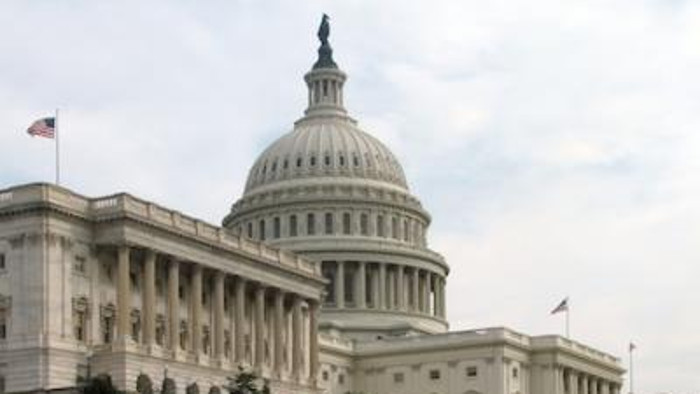NAB Backs Sen. Cantwell's Call for FCC to Update Rules on vMVPDs
Cantwell has sent a letter to the FCC asking it to consider treating vMVPD streaming platforms like YouTube TV as traditional pay TV operators

WASHINGTON, D.C.—Senator Maria Cantwell, D-Wash. and chair of the Senate Committee on Commerce, Science and Transportation has sent a letter to the FCC urging the agency to reopen its record on vMVPDs like YouTube TV and consider reclassifying them so that they would have to adhere to the same rules at traditional multichannel video providers.
Broadcasters and the NAB have long pushed for revising the rules governing vMVPDs like Sling TV, FuboTV, Hulu with Live TV, DirecTV Now and others who provide packages of streaming channels over the internet.
The letter complements remarks made by Sen. Cantwell at a June 22 hearing of the Senate Comittee on Commerce, Science and Transportation. During the hearing Cantwell noted that the FCC opened a record in 2014 to examine the issue of how streaming services should treated but “has been stalled [on the issue] for nearly a decade.”
“So today, I'm sending a letter to Commissioner Rosenworcel to refresh the record on this issue, and to say that streaming media services should bargain in good faith," Cantwell said. "Just as we've had to put good faith in other parts of the media landscape to make sure that we're adhering to the types of things that will give them a fair value for their content.”
During the hearing President Biden’s nominee to the FCC Anna Gomez said that she agreed with the idea of reopening the issue. “Local broadcasting is so important,” she said. “It is where citizens can learn about the news about emergencies and the economic model is getting more and more challenging giving the changes in the marketplace. So if confirmed, I would certainly want to work with you, with the committee to understand this issue and delve into [the issue and see] what the commission can do given the current law.”
In response to Sen. Cantwell's remarks at today's hearing and letter urging the FCC to refresh the record on vMVPDs, NAB president and CEO Curtis LeGeyt issued a statement saying the “NAB is grateful to Chair Cantwell for her continued leadership to preserve and strengthen broadcasters’ valuable local journalism and public service in a shifting media landscape. As every consumer recognizes, streaming platforms have drastically changed their ability to access local broadcast content. We echo Chair Cantwell’s call for the FCC to update its vMVPD proceeding to examine this issue, and look forward to working closely with the Commission and lawmakers to inform their deliberations.”
The FCC initially didn’t take action to classify streaming services as MVPDs in part because the industry was still in its infancy and because of the complexity of the issue.
The professional video industry's #1 source for news, trends and product and tech information. Sign up below.
“In the nearly ten years since the FCC launched the proceeding, the video service landscape has changed dramatically,” Cantwell noted in her letter. “However, today when viewers have more options for what content to watch (and which platform to watch it from), local broadcasts remain the recognized expert and dominant source for local news for many Americans. Moreover, local broadcast news has increased its content output in recent years. There is 90 percent more local news being broadcast than 20 years ago, producing an average of more than six hours of programming per weekday. Local stations provide news that is essential to our nation’s security. They keep the public informed and strengthen our democracy with on-the-ground reporting that counters misinformation and holds the powerful accountable.
"Conversely, during this same time period, more and more households have made the decision to `cut the cord,' as the penetration rate for traditional MVPDs in the United States has dropped from 88.3 percent in 2013 to 51.6 percent in 2022," the letter continued. "In their place, linear television streaming services, also known as virtual MVPDs (vMVPDs), are quickly growing subscribers. For example, when this proceeding was first noticed in 2014, none of the top five linear television streaming services (e.g., YouTube TV, Hulu Live, Sling TV, DIRECTV Stream, Fubo TV) even existed.”
Coupled with these changes, Cantwell wrote, local broadcasters now face a much more precarious financial climate in funding this local news because advertising has shifted from TV to digital, much of which goes into the coffers of a few tech giants.
“Failure to be fully compensated for their content compounds the steady decline in revenue local broadcasters have experienced as advertisers have also migrated online,” she wrote. “For example, between 2000 and 2018, local television stations’ advertising revenue fell by 40 percent. We must ensure that new technological trends do not further endanger our local broadcasters, and so it is critical that the FCC consider whether the current retransmission consent model is sustainable and continues to benefit our local communities.”
Cantwell acknowledged, however, that the issue is a complex one.
Pay TV operators have argued that ongoing subscriber losses and cord cutting is being fueled in part by rising programing costs and expensive retransmission consent agreements with broadcast station groups.
Compounding the issue is the fact that vMVPDs have not seen the rapid growth that many analysts initially expected and that some have seen declining subs in the last year or two because programming costs have forced them to raise rates.
The issue is further complicated by the emergence of free ad-supported bundles of content like Pluto TV, Tubi, Sling Freestream and The Roku Channel.
Should these services be treated as MVPDs? And if not, how should regulators classify the bundles of streaming channels that traditional pay TV operators like Comcast deliver directly over the Internet to broadband customers?
Another related issue is who would negotiate retransmission agreements with the pay TV providers. Currently station groups negotiate the deals with traditional MVPDs while the broadcast networks handle negotiations with vMVPDs like FuboTV and other streaming services.
As a result, station groups share the fees with networks and get less revenue from the vMVPDs. But the broadcast networks may be unwilling to back a change that would return these deals to the station groups.
George Winslow is the senior content producer for TV Tech. He has written about the television, media and technology industries for nearly 30 years for such publications as Broadcasting & Cable, Multichannel News and TV Tech. Over the years, he has edited a number of magazines, including Multichannel News International and World Screen, and moderated panels at such major industry events as NAB and MIP TV. He has published two books and dozens of encyclopedia articles on such subjects as the media, New York City history and economics.

